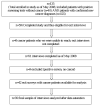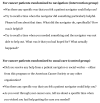Patients' experiences with navigation for cancer care
- PMID: 20006459
- PMCID: PMC2891343
- DOI: 10.1016/j.pec.2009.10.024
Patients' experiences with navigation for cancer care
Abstract
Objective: We examined how navigation, defined as the assessment and alleviation of barriers to adequate health care, influences patients' perspectives on the quality of their cancer care.
Methods: We conducted post-study patient interviews from a randomized controlled trial (usual care vs. patient navigation services) from cancer diagnosis through treatment completion. Patients were recruited from 11 primary care, hospital and community oncology practices in New York. We interviewed patients about their expectations and experience of patient navigation or, for non-navigated patients, other sources of assistance.
Results: Thirty-five patients newly diagnosed with breast or colorectal cancer. Valued aspects of navigation included emotional support, assistance with information needs and problem-solving, and logistical coordination of cancer care. Unmet cancer care needs expressed by patients randomized to usual care consisted of lack of assistance or support with childcare, household responsibilities, coordination of care, and emotional support.
Conclusion: Cancer patients value navigation. Instrumental benefits were the most important expectations for navigation from navigated and non-navigated patients. Navigated patients received emotional support and assistance with information needs, problem-solving, and logistical aspects of cancer care coordination.
Practice implications: Navigation services may help improve cancer care outcomes important to patients by addressing fragmented, confusing, uncoordinated, or inefficient care.
Copyright 2009 Elsevier Ireland Ltd. All rights reserved.
Figures
References
-
- Freeman HP, Muth BJ, Kerner JF. Expanding access to cancer screening and clinical follow-up among the medically underserved. Cancer Pract. 1995;3:19–30. - PubMed
-
- Jandorf L, Fatone A, Borker PV, et al. Creating alliances to improve cancer prevention and detection among urban medically underserved minority groups. The East Harlem Partnership for Cancer Awareness. Cancer. 2006;107 51 - PubMed
-
- Baquet CR, Mack KM, Mishra SI, et al. Maryland's Special Populations Network. A model for cancer disparities research, education, and training. Cancer. 2006;107 70 - PubMed
-
- Gabram SG, Lund MB, Gardner J, et al. Effects of an outreach and internal navigation program on breast cancer diagnosis in an urban cancer center with a large African-American population. Cancer. 2008;2008 - PubMed
-
- Fischer SM, Sauaia A, Kutner JS. Patient navigation: a culturally competent strategy to address disparities in cancer care. Journal of Palliative Medicine. 2009;10:1023–1028. - PubMed
Publication types
MeSH terms
Grants and funding
LinkOut - more resources
Full Text Sources
Medical



